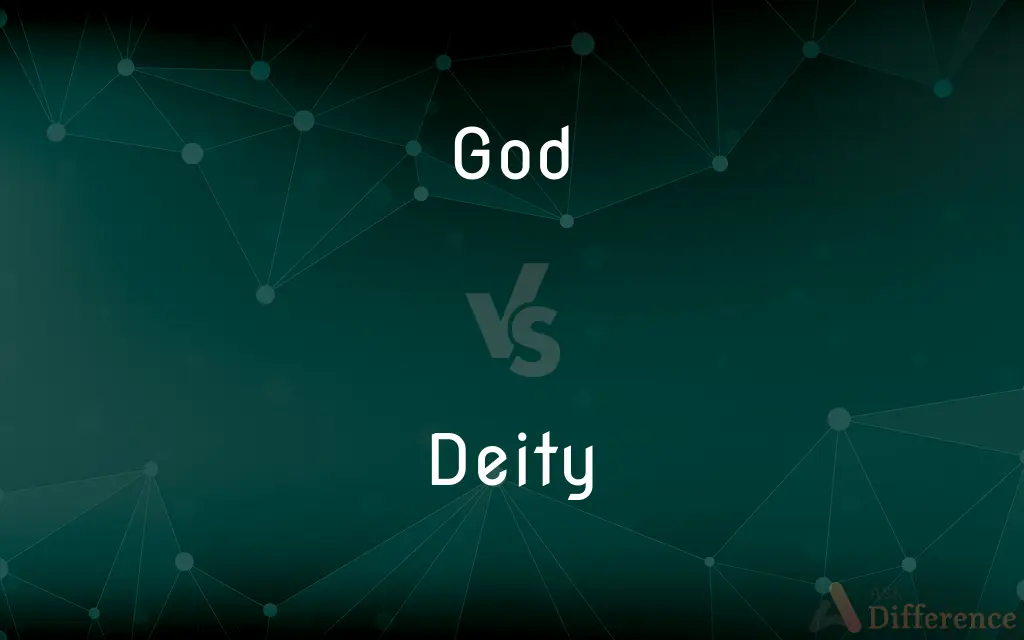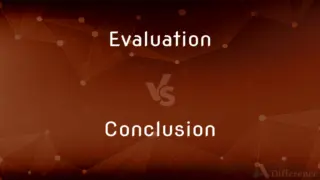God vs. Deity — What's the Difference?
By Tayyaba Rehman — Updated on October 2, 2023
God is a supreme being worshipped in monotheistic religions. Deity is a god or goddess in a polytheistic religion.

Difference Between God and Deity
Table of Contents
ADVERTISEMENT
Key Differences
In many religious contexts, the term "god" often refers to a singular, all-powerful entity that is central to monotheistic beliefs. This entity is seen as the omnipotent, omniscient creator and overseer of the universe. Conversely, "deity" is a more generic term that encompasses a range of divine beings. It doesn't assume singularity or supremacy and can include various gods and goddesses, especially in polytheistic settings.
While "god" can be seen as specific and exclusive in its connotation, mainly pointing to a singular divine presence, "deity" is broader and more inclusive. A deity can be any divine character, whether major or minor, in any given mythology or religious tradition. For instance, in Greek mythology, Zeus might be considered a major deity, while a nymph might be a minor one.
Both "god" and "deity" can also be used metaphorically. A person might be described as a "god" in a certain field, meaning they are unparalleled in skill or achievement. Similarly, someone might be said to have a "deity-like" presence, suggesting they have an aura of power or charisma. However, it's important to note that while "god" can be used in this colloquial way, "deity" retains a more formal tone.
In grammar, "god" can be both a proper noun (when referring to the singular God of monotheistic religions) and a common noun (when discussing a god in general terms). "Deity", on the other hand, is always a common noun and encompasses a wider range of divine beings without the specificity or exclusivity that "god" can sometimes carry.
To understand these terms in context, think of Christianity, which believes in one God. Here, "god" is used in a singular and supreme sense. But when discussing ancient Roman religion, with its pantheon of divine figures, each of those figures can be described as a "deity."
ADVERTISEMENT
Comparison Chart
Religious Context
Central to monotheistic religions.
Found in both monotheistic and polytheistic religions.
Number
Singular in monotheistic contexts.
Can be singular or plural.
Rank
Always supreme in monotheistic religions.
Can be major or minor in polytheistic religions.
Grammatical Usage
Can be a proper noun or a common noun.
Always a common noun.
Colloquial Usage
Can be used colloquially (e.g., "a god in his field").
Typically retains a more formal tone.
Compare with Definitions
God
A supreme divine being in monotheism.
In Christianity, believers pray to God for guidance.
Deity
A divine character in a religious tradition.
In Hinduism, there are several deities representing various aspects of life.
God
Any divine being worshipped in various religions.
Ancient Egyptians had a sun god named Ra.
Deity
A source of divine power or presence.
Some believe natural landmarks, like mountains, can be a deity in their own right.
God
A person who is exceptionally skilled in a particular area.
In the world of chess, many see Magnus Carlsen as a god.
Deity
Any supernatural or divine force believed to influence human affairs.
Many cultures rely on appeasing local deities for good harvests.
God
An idol or object of worship.
He treated money as his god, prioritizing it above all else.
Deity
A god or goddess in any religion or mythology.
Aphrodite is a deity of love in Greek mythology.
God
In monotheistic thought, God is conceived of as the supreme being, creator, and principal object of faith. God is usually conceived of as being omnipotent, omniscient, omnipresent and omnibenevolent as well as having an eternal and necessary existence.
Deity
A representation of a divine figure in art or sculpture.
The museum displayed a deity carved from jade.
God
A being conceived as the perfect, omnipotent, omniscient originator and ruler of the universe, the principal object of faith and worship in monotheistic religions.
Deity
A deity or god is a supernatural being considered divine or sacred. The Oxford Dictionary of English defines deity as a god or goddess (in a polytheistic religion), or anything revered as divine.
God
The force, effect, or a manifestation or aspect of this being.
Deity
A god or goddess.
God
A being of supernatural powers or attributes, believed in and worshiped by a people, especially a male deity thought to control some part of nature or reality.
Deity
The essential nature or condition of being a god; divinity.
God
An image of a supernatural being; an idol.
Deity
Deity God. Used with the.
God
One that is worshiped, idealized, or followed
Money was their god.
Deity
Synonym of divinity: the state, position, or fact of being a god.
God
A deity or supreme being; a supernatural, typically immortal, being with superior powers, to which personhood is attributed.
The most frequently used name for the Islamic god is Allah.
Deity
A supernatural divine being; a god or goddess.
God
Alternative case form of God.
Deity
The collection of attributes which make up the nature of a god; divinity; godhead; as, the deity of the Supreme Being is seen in his works.
They declared with emphasis the perfect deity and the perfect manhood of Christ.
God
An idol.
Deity
A god or goddess; a heathen god.
To worship calves, the deitiesOf Egypt.
This great poet and philosopher [Simonides], the more he contemplated the nature of the Deity, found that he waded but the more out of his depth.
God
A representation of a deity, especially a statue or statuette.
Deity
Any supernatural being worshipped as controlling some part of the world or some aspect of life or who is the personification of a force
God
Something or someone particularly revered, worshipped, idealized, admired and/or followed.
God
A person who is exceptionally skilled in a particular activity.
God
(metaphor) A person in a high position of authority, importance or influence.
God
(metaphor) A powerful ruler or tyrant.
God
(colloquial) An exceedingly handsome man.
Lounging on the beach were several Greek gods.
God
The person who owns and runs a multi-user dungeon.
God
Alternative form of God
God
(transitive) To idolize.
God
(transitive) To deify.
God
Good.
God
A being conceived of as possessing supernatural power, and to be propitiated by sacrifice, worship, etc.; a divinity; a deity; an object of worship; an idol.
He maketh a god, and worshipeth it.
The race of Israel . . . bowing lowly downTo bestial gods.
God
The Supreme Being; the eternal and infinite Spirit, the Creator, and the Sovereign of the universe; Jehovah.
God is a Spirit; and they that worship him must worship him in spirit and in truth.
God
A person or thing deified and honored as the chief good; an object of supreme regard.
Whose god is their belly.
God
Figuratively applied to one who wields great or despotic power.
God
To treat as a god; to idolize.
God
The supernatural being conceived as the perfect and omnipotent and omniscient originator and ruler of the universe; the object of worship in monotheistic religions
God
Any supernatural being worshipped as controlling some part of the world or some aspect of life or who is the personification of a force
God
A man of such superior qualities that he seems like a deity to other people;
He was a god among men
God
A material effigy that is worshipped as a god;
Thou shalt not make unto thee any graven image
Money was his god
God
A powerful ruler or leader.
The pharaoh was considered a god by his subjects.
Common Curiosities
Can "deity" be used in a metaphorical sense like "god"?
While "god" is often used metaphorically, "deity" is typically used in more formal, religious contexts.
What does "god" generally refer to in monotheistic religions?
In monotheistic religions, "god" refers to a singular, all-powerful divine entity.
Do all religions have the same concept of "god"?
No, the concept of "god" varies widely among different religions.
How does "deity" differ from "god" in terms of number?
"God" is singular in monotheistic contexts, while "deity" can refer to any number of divine beings.
How do polytheistic religions generally use the term "deity"?
Polytheistic religions use "deity" to refer to any of their various gods and goddesses.
Can the term "deity" refer to both gods and goddesses?
Yes, "deity" can refer to both gods and goddesses.
Can an object or concept be referred to as a "god"?
Yes, in a metaphorical sense, things like money or fame can be treated as "gods."
Is "god" always capitalized?
No, "god" is capitalized when referring to the singular God of monotheistic religions but not when referring to a god in general terms.
Can "god" and "deity" be used interchangeably?
While they have overlapping meanings, context matters. "God" often implies singularity and supremacy, whereas "deity" is broader.
Do the terms "god" and "deity" have origins in specific cultures or religions?
Both terms have ancient origins and have been used in various cultures and religious contexts.
Can "god" be a feminine figure?
Yes, while "God" in monotheistic religions is often viewed as male, many cultures and religions have female gods or goddesses.
Is every "deity" considered supreme in their respective religious context?
No, while some deities are major figures, others might be considered minor.
Can nature elements be considered "deities"?
Yes, in many cultures, natural elements like rivers, mountains, or the sun are revered as deities.
Share Your Discovery

Previous Comparison
Evaluation vs. Conclusion
Next Comparison
Assignment vs. ProjectAuthor Spotlight
Written by
Tayyaba RehmanTayyaba Rehman is a distinguished writer, currently serving as a primary contributor to askdifference.com. As a researcher in semantics and etymology, Tayyaba's passion for the complexity of languages and their distinctions has found a perfect home on the platform. Tayyaba delves into the intricacies of language, distinguishing between commonly confused words and phrases, thereby providing clarity for readers worldwide.
















































